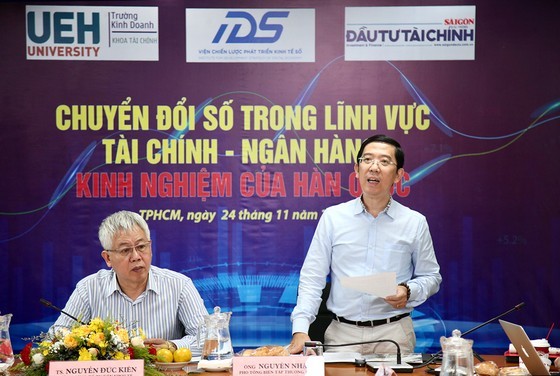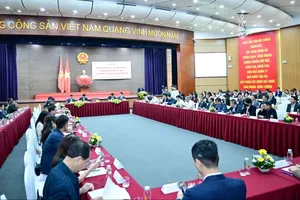
Dr. Tran Van – Head of the Institute of Digital Economy Development Strategy – said that RoK has gained impressive successes in its digital transformation process due to its continuous updates and adjustments of its legal system and the strong determination.
At present, it takes a digital bank in this country about 55 seconds to distribute money in loan cases, compared to 5 minutes’ work of conventional banks. Meanwhile, the latter are developing their own applications for smart devices, and some are as useful and user-friendly as Fintech services to accommodate to the needs of all customer types.
RoK released Fintech-related and digital-bank-related laws a long time ago. It imposes clear regulations on sandbox piloting with the motto ‘Permit first – Adjustments later’.
“It is tough not to have proper legal regulations for a full digital transformation in the banking-finance sector. No matter how advanced technologies are, there is still a risk potential for both users and service providers”, said Dr. Van.
He then suggested certain policies for digital transformation in the banking-finance sector in Vietnam, including
_Amending and supplementing the Laws on the State Bank, on Credit Institutions, and on Deposit Insurance
_Introducing the Law on Personal Data Protection
_Completing the common national database for the digital economy, government, and society – the three pillars in the national digital transformation process
_Promoting comprehensive finance via sandbox piloting for digital banks and Fintech applications to serve the low-incomed, the vulnerable, small- and medium-scaled enterprises in order for the investment and savings capital to flow in the society.
Deputy Director Le Anh Dung of the Payment Department (under the State Bank of Vietnam) informed on the two main trends for digital bank development in the world, namely digitalizing banking activities and establishing banking entities that implement digital technologies and work on digital channels only.
In Vietnam, many commercial banks have actively worked with Fintech companies to offer digital services or even form digital banking brand names in order to improve the performance of banking activities as well as creating a digital ecosystem. Some typical examples would be Timo Plus, Cake, whose operations are based on the business permit of the parent or partner bank.
Deputy Director Dung commented that the appearance of such digital models urges the State Bank of Vietnam to introduce clearer policies or even a legal framework and detailed, consistent legal regulations to better monitor and manage banking activities.
He added that Vietnam could use RoK’s experience as a reference during the digital transformation of the banking-finance sector. However, Vietnam should not consider issuing permits for independent digital banking entities, but to boost the preparation of policies, regulations for the growth of digital banking such as building and operating a legal framework for testing Fintech activities in the banking sector (sandbox, regulatory); amending, supplementing, or promulgating new legal regulations to facilitate digital application.
The issuance of a business permit for a digital banking entity should be carefully considered, based on practical needs and international trends, as well as the direction to restructure the banking system as decided by the Prime Minister.

Experts in the field agreed that in the digital era of Industry 4.0, with swift changes of customer behaviors and the continuing appearance of new business models, banks and financial organizations must perform the critical digital transformation process. To do so, ministries and state agencies must first amend corresponding laws to eliminate any possible risks.
Dr. Nguyen Duc Kien from the Economics Consultation Team of the Prime Minister said that the vital digital transformation in the banking-finance sector must answer the needs of the country during its socio-economic development. This process should be done flexibly and effectively to create convenient conditions for both consumers and state management units to monitor.
Dr. Duong Quoc Anh – Deputy Head of the Institute of Digital Economy Development Strategy mentioned the toughest challenge in this process: lack of human resources that are fluent in both the IT and banking fields. Along with that is a huge financial demand to invest in digital transformation. Therefore, credit organizations should take advantage of digital technologies to offer services and products to customers while the legal frame must be completed to protect consumers using financial services.
Standing Deputy Editor-in-Chief of SGGP Newspaper Nguyen Thanh Loi hoped that this discussion could offer more feasible solutions to help state management units to choose the most practical and suitable ones to adopt so that Vietnam can become a prosperous digital nation in the near future.










)

)











